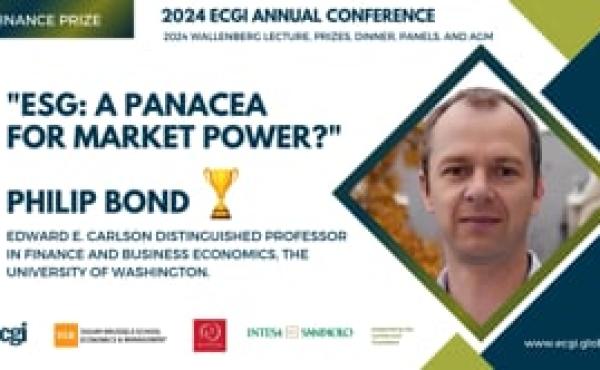
The ECGI blog is kindly supported by

Prize Award: ESG: A Panacea for Market Power?
Philip Bond and Doron Levit’s paper, recognized with the ECGI Finance Prize, examined the economic implications of ESG (Environmental, Social, and Governance) commitments, particularly how these commitments influence market power. While ESG policies are often seen as tools for positive social impact, Bond and Levit provided a nuanced view, arguing that the effects of ESG vary significantly based on policy intensity. Their findings challenge the assumption that all ESG policies are inherently beneficial, revealing that overly aggressive ESG practices may harm market competitiveness and reduce total industry welfare.
The authors presented the idea of a moderate vs. aggressive ESG approach: moderate ESG commitments, they argued, can enhance competitiveness by building stakeholder loyalty, improving worker satisfaction, and attracting customers, thereby benefiting both the firm and the industry. However, aggressive ESG strategies—such as paying significantly above-market wages or prioritizing extreme environmental standards—can create anti-competitive dynamics, benefiting the ESG-focused firm’s stakeholders while potentially reducing total employment and production in the industry.
Bond and Levit’s concept of an “ESG cycle” further illustrates the interplay between moderate and aggressive ESG policies. They argue that profit-maximizing firms have strong incentives to outdo their competitors' ESG policies if such policies are moderate; but similarly strong incentives to abandon ESG if competitors adopt aggressive ESG policies. Unfortunately, competition in ESG policies between shareholder-focused firms fails to push an industry towards a socially optimal level of ESG---or indeed, even towards a stable level. But more positively, their analysis suggests that if firms pick ESG policies to balance profits with the interests of employees and customers then inter-firm competition delivers a socially beneficial level of ESG.
Lessons and Broader Implications
The two prize-winning papers collectively highlighted the need for balanced, context-aware governance in navigating modern challenges, from the political influence of controlling shareholders to the nuanced economic effects of ESG policies. Both papers illustrated that corporate governance is no longer confined to shareholder-manager relations; it also intersects with national security, social responsibility, and market dynamics. This broad perspective prompts companies, investors, and regulators to adopt a more holistic view of governance, one that accounts for a company’s influence on external ecosystems and its role in broader societal frameworks.
A common thread in both papers was the recognition that unchecked influence and extreme strategies, whether in ownership or ESG commitments, can lead to unintended consequences. Milhaupt’s work underscored the risks of concentrated control in global industries critical to national security, while Bond and Levit highlighted the potential anti-competitive effects of excessive ESG commitments. Together, these insights underscore the importance of calibrated governance frameworks that balance innovation and influence with accountability and market health.
_______________
This article is Part Six of a seven-part blog series covering insights and reflections from the 2024 ECGI Annual Conference.
Explore the rest of the posts: read Part One, read Part Two, read Part Three, read Part Four, read Part Five, and read Part Seven.
Related materials
Philip Bond (University of Washington) presented the Intesa Sanpaolo Finance Prize-winning paper, 'ESG: A Panacea for Market Power?', co-authored with Doron Levit.
Access the presentation slides here.




